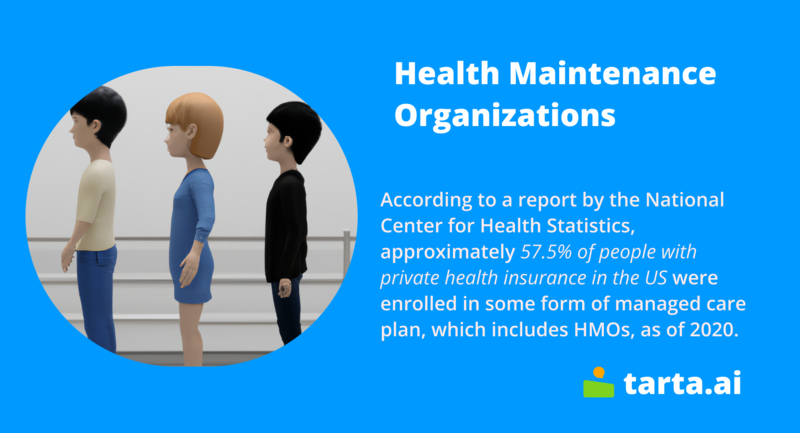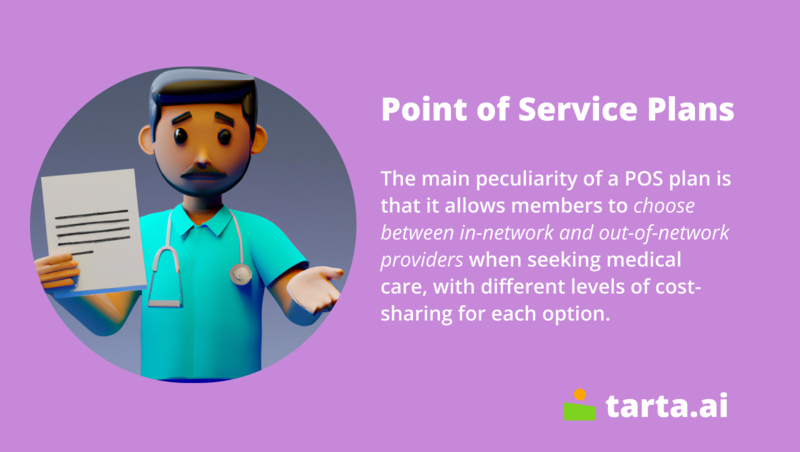Are Health Maintenance Organizations (HMOs) Best Choice?
What is HMO?
A Health Maintenance Organization (HMO) is a type of health insurance plan that provides healthcare services through a network of healthcare providers. Individuals who enroll in an HMO plan typically need to choose a primary care physician (PCP) within the network who acts as their main point of contact for all their healthcare needs. The PCP is responsible for managing and coordinating the individual's care, and may refer them to specialists within the network when necessary. HMOs often prioritize preventive care, and may offer lower out-of-pocket costs and premiums compared to other types of health insurance plans. However, HMOs typically have more restrictions on out-of-network care and less flexibility in choosing healthcare providers compared to other plans like Preferred Provider Organizations (PPOs).

HMO Provider Network
HMOs have a provider network, which is a group of healthcare providers that have agreed to provide services to individuals who are enrolled in the HMO plan. The provider network typically includes primary care physicians, specialists, hospitals, and other healthcare facilities. In most cases, individuals who are enrolled in an HMO plan need to choose a primary care physician (PCP) within the network. The PCP acts as the individual's main point of contact for all their healthcare needs and is responsible for managing and coordinating their care. If the individual needs to see a specialist, the PCP will usually provide a referral to a specialist within the HMO network.
NOTE
HMO plans generally have more restrictions on out-of-network care compared to other types of health insurance plans. In some cases, out-of-network care may not be covered at all, or may be subject to higher out-of-pocket costs. This is why it's important for individuals who are considering enrolling in an HMO plan to carefully review the plan's provider network and consider whether it includes the healthcare providers they need or prefer.
HMOs Benefits
Health Maintenance Organizations (HMOs) is a popular type of health insurance plan that offers comprehensive coverage, often at a lower cost than other types of plans. HMOs typically have a network of healthcare providers that individuals must choose from, with a focus on preventive care and coordinated care through a primary care physician (PCP). Here are some pluses of HMO:
- Lower out-of-pocket costs: HMOs often have lower out-of-pocket costs compared to other types of health insurance plans. This may include lower deductibles, copayments, and coinsurance.
- Comprehensive coverage: HMOs typically offer comprehensive coverage for a wide range of healthcare services, including preventive care, medical treatments, and prescription drugs.
- Preventive care focus: HMOs often prioritize preventive care, including regular check-ups, immunizations, and screenings, which can help individuals stay healthy and catch potential health issues early.
- Coordinated care: HMOs usually require individuals to choose a primary care physician (PCP) within the network, who is responsible for coordinating and managing their care. This can help ensure that all of the individual's healthcare needs are met and that there are no gaps in their care.
- Predictable costs: HMOs often have predictable costs, with fixed copayments for most services. This can help individuals budget for their healthcare expenses.
- Lower premiums: HMOs may offer lower premiums compared to other types of health insurance plans, which can make them an affordable option for individuals and families.
Fact
According to a report by the National Center for Health Statistics published in 2020, about 19.4% of individuals under the age of 65 with private health insurance coverage in the United States were enrolled in a Health Maintenance Organization (HMO) plan in 2019.
HMO Limitations
While Health Maintenance Organizations (HMOs) offer many benefits, there are also some limitations to consider, including:
- Limited provider network: HMOs require individuals to choose healthcare providers within their network, which may be limited in some areas or for certain specialties. This can make it difficult for individuals who need to see out-of-network providers or specialists.
- Referral requirements: HMOs often require individuals to get a referral from their primary care physician (PCP) before seeing a specialist or receiving certain medical treatments. This can add an extra step to the healthcare process and may delay necessary care.
- Limited coverage for out-of-network care: HMOs typically only cover care received within their network. If an individual needs to see an out-of-network provider, they may need to pay out-of-pocket for these services.
- Less flexibility: HMOs require individuals to follow specific rules and procedures when seeking medical care, which may limit their flexibility and choice in healthcare decisions.
- Penalties for going out-of-network: HMOs may impose penalties or additional costs for individuals who seek care outside of their network without proper authorization.
It's important for individuals to carefully review the limitations of HMOs and consider their healthcare needs and preferences when choosing a health insurance plan.
HMO vs. other types of Health Insurance Plans
There are several types of health insurance plans available, each with their own pros and cons. Here are some key differences between HMOs and other types of health insurance plans:
- Preferred Provider Organizations (PPOs): PPOs offer a larger network of providers compared to HMOs, and typically do not require referrals to see specialists. However, PPOs often have higher out-of-pocket costs and may not cover out-of-network care as comprehensively as HMOs.
- Exclusive Provider Organizations (EPOs): EPOs are similar to HMOs in that they require individuals to choose providers within their network. However, EPOs may offer more flexibility in terms of specialist referrals and out-of-network care, and may have lower premiums compared to HMOs.
- Point of Service (POS) plans: POS plans combine features of both HMOs and PPOs, allowing individuals to choose between in-network and out-of-network care. However, POS plans may have higher out-of-pocket costs compared to HMOs.

When deciding between different types of health insurance plans, individuals should consider their healthcare needs, budget, and preferred level of flexibility in choosing healthcare providers. It's important to carefully review the features and limitations of each plan before making a decision.
Reasons for Choosing an HMO Plan
Reason | Explanation |
Provider network | HMOs have a limited network of providers, so it's important to make sure the plan includes providers and facilities that meet your healthcare needs. |
Referrals | HMOs require individuals to get a referral from their primary care physician before seeing a specialist. Consider whether this referral process may impact your ability to see certain specialists or receive timely care. |
Cost | HMOs may have lower premiums compared to other types of health insurance plans, but often have higher out-of-pocket costs. Make sure to review the plan's deductibles, copays, and coinsurance to understand your potential healthcare costs. |
Prescription drug coverage | HMOs typically offer prescription drug coverage, but the formulary (list of covered medications) may be limited. Check if your medications are covered and if there are any restrictions or prior authorization requirements. |
Out-of-network coverage | HMOs generally do not cover out-of-network care, except in emergency situations. Consider whether you may need out-of-network care and if this lack of coverage could impact your healthcare costs. |
Additional benefits | Some HMO plans may offer additional benefits, such as wellness programs or telehealth services. Consider whether these benefits align with your healthcare needs. |
Examples of HMOs
- Kaiser Permanente HMO: Kaiser Permanente is a well-known HMO that operates in several states across the US. They offer a range of health insurance plans, including HMOs, that provide comprehensive coverage and access to Kaiser Permanente's network of healthcare providers.
- Blue Shield HMO: Blue Shield is a non-profit health insurance provider that offers HMO plans in several states, including California. Their HMO plans typically offer lower out-of-pocket costs compared to other types of health insurance plans.
- Aetna HMO: Aetna is a large health insurance provider that offers HMO plans in several states. Their HMO plans typically require members to choose a primary care physician (PCP) and get referrals for specialist care.
- Cigna HMO: Cigna is a global health services company that offers HMO plans in several states. Their HMO plans typically offer lower out-of-pocket costs and require members to choose a PCP.
- UnitedHealthcare HMO: UnitedHealthcare is a large health insurance provider that offers HMO plans in several states. Their HMO plans typically require members to choose a PCP and get referrals for specialist care.
- Humana HMO: Humana is a health insurance provider that offers HMO plans in several states. Their HMO plans typically require members to choose a PCP and get referrals for specialist care.
- Health Net HMO: Health Net is a health insurance provider that offers HMO plans in several states, including California. Their HMO plans typically offer lower out-of-pocket costs and require members to choose a PCP.
- Molina Healthcare HMO: Molina Healthcare is a health insurance provider that offers HMO plans in several states. Their HMO plans typically require members to choose a PCP and get referrals for specialist care.
It's important to note that the specific features and costs of each HMO plan can vary, so it's important to carefully review the plan details before enrolling. Additionally, the availability of specific HMO plans may vary by location, so it's important to check what options are available in your area.
- Health Maintenance Organizations (HMOs) are a type of managed care health insurance plan that typically offer lower out-of-pocket costs and a more limited provider network compared to other types of plans.
- HMOs typically require members to choose a primary care physician (PCP) who serves as their primary point of contact for all healthcare needs.
- HMOs may require referrals from the PCP for specialist care or other services, and may not cover out-of-network care except in emergency situations.
- HMOs may be a good fit for individuals who prioritize lower costs and are comfortable with a more limited network of providers, as well as those who prefer having a PCP to coordinate their healthcare.
- When considering an HMO plan, it's important to carefully review the specific benefits, limitations, and costs to determine if it's the best fit for your healthcare needs and budget.
FAQ
What is a Health Maintenance Organization (HMO)?
A healthcare plan that requires members to choose a primary care physician (PCP) who manages their healthcare and refers them to specialists as needed.
What are the advantages of joining an HMO?
HMOs can be more affordable than other types of health insurance plans and typically provide comprehensive care.
What are the limitations of HMOs?
HMOs typically have a limited network of healthcare providers, which can limit your options for care.
How do HMOs differ from other types of healthcare plans?
HMOs require members to choose a PCP and typically only cover care provided by healthcare providers within their network.
Do HMOs cover all medical expenses?
No, HMOs typically only cover medical expenses that are considered medically necessary and provided by healthcare providers within their network.